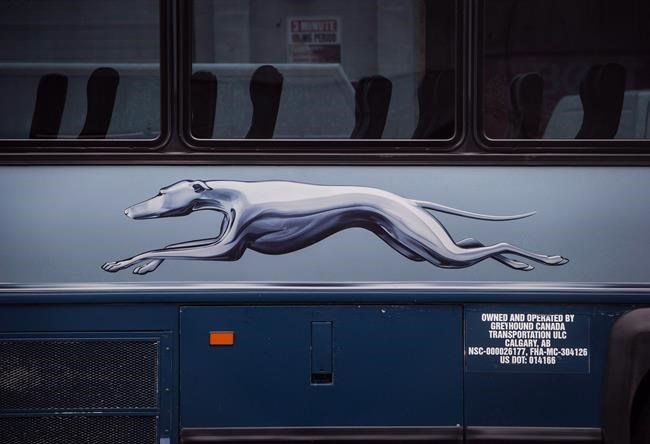
The Greyhound logo is seen on one of the company's buses, in Vancouver, on Monday July 9, 2018. The federal government says it will step in to support the transportation needs of some northern and remote communities affected by the closure of Greyhound bus operations in western Canada and northern Ontario. THE CANADIAN PRESS/Darryl Dyck
Republished October 31, 2018 - 2:54 PM
Original Publication Date October 31, 2018 - 6:51 AM
Retired bus driver Iain Gray ambled through Calgary's cavernous Greyhound depot on its last day in operation, a gold pin with the bus company's logo on his jacket.
Gray dropped by the station on Wednesday — the last day for must Greyhound routes in Western Canada — in the hopes of visiting a former colleague after his final run from Revelstoke, B.C.
Schedules were changed and it turns out the two friends missed each other.
"It's just a blooming shame," Gray, who is 77 and drove buses for 30 years until 2003, said of Greyhound's exit.
"It's the best place to work at. You couldn't imagine how good it was."
Greyhound announced in July that it would wind down all but one of its routes in Western Canada and northern Ontario. A U.S.-run route from Seattle to Vancouver is the only one that remains.
Gray said he loved doing local runs, particularly through the Crowsnest Pass in southwestern Alberta and into the British Columbia Interior.
"I liked going through the little towns and the people," he said. "You get to know the agents and all that kind of stuff."
Two weeks ago, he flew to Salmon Arm, B.C., to go fishing with his brother and decided to take the Greyhound back to Calgary.
"The bus was full, believe it or not," said Gray, who noted that service had been reduced to two trips a day from five or six.
"If you talk to the driver, those trips are full, but that's not enough to keep the company running."
Ottawa announced Wednesday that Canadians left isolated will have to wait two years for potential permanent replacements. Federal Transport Minister Marc Garneau said the government is open to helping affected provinces pay for bus service in communities where other companies have not taken over.
As well, Indigenous Services Minister Jane Philpott said her department will subsidize bus services to remote Indigenous communities where needed.
Greyhound's decision ends service in some 400 communities and leaves about 420 people out of work, said senior vice-president Stuart Kendrick, who was at the Calgary depot to oversee its closure.
The carrier has been active in Canada for about 85 years, but has seen a 40 per cent decline in rural ridership over the last decade, he said. A rural population drop, competition from low-cost airlines and greater car use have all taken a toll, he said.
Some routes had just one bus running a day, with single-digit ridership, Kendrick added.
"You need a lot more than that to pay the bills and keep the lights on and to be viable," he said.
"There's a lot of mixed emotions. Obviously since the July 9 announcement, there's a lot of sadness around by everybody."
Several regional companies have come forward to offer bus services and have taken over 87 per cent of the abandoned Greyhound routes, Garneau said. Some of those companies have already begun operating while others are set to roll in the next few weeks.
For the remaining 13 per cent, Ottawa will work with the provinces to come up with alternatives, Garneau said.
In the meantime, German backpacker Femke Bernds said she'll have to find a cost-effective alternative as she works her way to Vancouver from Calgary.
The 28-year-old said it was a shock to learn of Greyhound's route closures shortly after her August arrival in Canada.
"It was not so nice. It's a good bus to travel with and it's not so expensive," she said, a red rucksack slung over her shoulder.
"When you are travelling through a big country it's good to have an option where you can travel cheaper and ... that's not so possible now."
News from © The Canadian Press, 2018